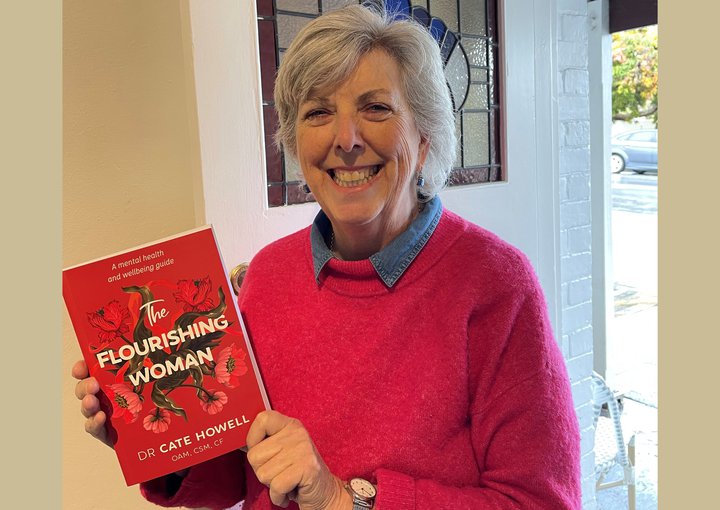4 October 2023
GP, therapist, researcher, educator and author, Adelaide based Dr. Cate Howell has over 40 years' experience in the heath sector and is passionate about mental health and wellbeing. Her new book, The Flourishing Woman, is a unique holistic guide to fostering women's mental health and wellbeing.
I tried hard to catch up with Cate over Zoom for a chat about The Flourishing Woman but was stymied by internet drama and time differences, so I ended up sending her my questions in writing. Not exactly the same experience, but still very interesting!

The word ‘flourishing’ is an interesting one. What does it mean for a woman to flourish and why is it important in today’s world?
Flourishing refers to thriving in life, or finding fulfilment, meaning and connection. It is about our sense of life satisfaction, purpose and realising our potential.
Flourishing is influenced by our mental health and wellbeing. The term mental health is often misunderstood. Sometimes it is equated with illness, but it is about feeling healthy and having a sense of wellbeing. Mental health reflects our psychological and social wellbeing, and it includes coping with stress in life, managing our mood and anxiety levels, resilience, and contributing to our different roles and relationships.
However, there are times when it is very hard to have a sense of flourishing, especially when life throws challenges in our path. Our mental health and wellbeing have been especially challenged during the COVID-19 pandemic. This need is evident in therapy practices across the world, in conversations between women, and in the media.
Additionally, the modern world is full of demands and expectations, and a level of chronic stress (family to care for, a relationship to maintain, work to do, a career to manage, bills to pay, elderly parents to keep an eye on, pressure to look a certain way and more!).
A key point in relation to flourishing is that as women we are probably more used to supporting family members, friends, or colleagues, rather than looking after ourselves. But if we don’t care for ourselves, we cannot care for others. This approach is not selfish. We need to prioritize our mental health and wellbeing and take the much-needed time and steps to do this. We will then see the benefits for ourselves and for our loved ones.
The concept of self-compassion is strong through the book. Can you explain why this is so important and provide some tips for cultivating it?
Self-compassion is central to flourishing, and I included as one of the key steps to mental health and wellbeing. Over the years, I have talked to thousands of women in my practice and in teaching, and my experience is that women quite often put themselves low down on their priority list, may be very self-critical about themselves or hold a ‘not good enough story’ about themselves.
Author Kristen Neff has identified self-compassion as having three main elements, namely mindfulness, common humanity, and kindness. Neff says that we must be mindful of our uncomfortable emotions, acknowledge them and respond with kindness. We also need to recognise that we are human, and all have some imperfections and respond with kindness as we would give to others.
Self-compassion can assist us greatly by contributing to our wellbeing and helping us learn new ways of being. Self-compassion means that we are kind and understanding towards ourselves when we are having a challenging time, instead of criticising ourselves.
Nurturing ourselves through self-compassion gives pleasure and enables us to lift our own spirits. It is associated with happiness and optimism and can help us deal with emotional pain. One of the reasons it can do this is that it activates the soothing and calming parts of the nervous system.
Here are 10 tips for self-compassion:
- Apply the Golden Rule to yourself and treat yourself as you do others, with kindness and understanding.
- Remember that you are human and stop comparing yourself to others.
- Quit self-criticism: let go of judging yourself harshly or being too self-critical. Re-author some of the old stories and grow your self-belief.
- Practice mindfulness or being the present moment, which allows us to be more accepting.
- See that our perceived weaknesses can also be our strengths (e.g. being ‘stubborn’ may mean you persevere).
- Use kind words - don’t label yourself as hopeless or useless, or anything else that is too harsh.
- Learn to soothe uncomfortable emotions and reframe unhelpful thoughts.
- Put things into perspective, quit self-judgement and practice gratitude.
- Practice self-care including relaxing activities.
- Remember that self-compassion takes time and courage. You’ve got this!
Gender equality and women’s empowerment are important societal goals. How can the ideas and strategies in your book contribute toward these broader goals?
The Flourishing Woman addresses issues such as gender inequality in a several ways. It highlights information about the challenges women face in society and women and mental health issues. It hopefully raises awareness and questions in women’s minds and provides us with many strategies to address concerns and problems, and to feel more empowered.
Some of the challenges that are highlighted are gender inequality in relation to representation and pay levels, and women continuing to undertake most household and childcare responsibilities. These include often hidden work such as being the main organiser in the home and remembering a whole array of information related to a partner or family, including special occasions and children’s activities.
Women’s safety, in and out of the home, continuing to be a major and unacceptable issue, is also highlighted. This issue has many impacts on women’s lives, including the rate of mental health problems.
The facts and figures related to women’s mental health are provided. Rates of depression are reported to be double that of men, women are said to be two to three times as likely as men to be impacted by anxiety disorders, and the majority of those impacted by eating disorders are women. Mirroring the trauma experienced by women, we are twice as likely to develop post-traumatic stress disorder.
There are many potential reasons for the reported higher rates, but we must not ignore the evidence that women are often placed in a more vulnerable position in society, whether being seen as inferior, suffering more stress, or being subjected to abuse or violence. These factors will have a significant impact on mental health.
It is also suggested that even though we tend to talk about our issues, we may still internalise some emotions (such as anger). We also tend to go to the doctor regularly in the Western world in relation to reproductive issues or with children, so we may be more likely than men to speak with a doctor about our mental health at the time.
Research also suggests that women are also more likely to be diagnosed with a mental health disorder even in situations where men have the same scores on mental health assessments and are not diagnosed. Plus, we are also more likely to be prescribed medication. This raises questions and concerns about potential biases in terms diagnosis and treatment based on gender.
What are some misconceptions or myths about women’s wellbeing that you hope to dispel through your book?
A range of misconceptions and myths are addressed throughout the book in relation to mental health and wellbeing. One myth we come across in practice relates to women who feel ‘broken’ or that they cannot recover or move forwards in their lives. I would not have done the work I have done for many years if this was the case. Women are capable of growth and change throughout our lives, in part because of our adaptability (resilience) and because of neuroplasticity (the ability of the brain to grow and form new connections). This capacity for change inspires my writing.
Another inspiration for the book came from recent research from the South Australian Health and Medical Research Institute which has identified that mental illness and mental wellbeing are not two ends of a single spectrum, with health at one end and illness at the other. Mental illness and mental wellbeing are, in fact, two separate but inter-related continua, and the aim is to have a high level of mental wellbeing and a low level of illness. We can do this by focusing on ways to improve or maintain our mental health and wellbeing, and by recovering from or preventing mental illness. Hence the importance of focussing more on wellbeing as a means of improving our mental health and fostering our flourishing.
I also address myths and misconceptions related to reproductive and hormonal transitions and issues across the lifespan. Here are two examples:
What’s next for you? Do you have any upcoming projects you’d like to tell us about?
My focus is on spreading the word about mental health and wellbeing as far and wide as I can. I am doing this through teaching (undergraduate, postgraduate counsellors and health professionals), speaking at conferences and undertaking community talks in urban and rural areas, as well as radio and podcast interviews. I am open to any possibilities of getting the word out to the community.
I have also grown my website (www.drcatehowell.com.au) with blogs and resources, and I have written several online programs for health professionals and the public. There are more to come, including online activities based on The Flourishing Woman I also hope to record the book for those who prefer listening to reading.
I am driven by my desire to help people and by my curiosity and passion for mental health and wellbeing, and I have had a long-held interest in the spiritual aspects of life (I wrote a book on ‘Intuition’ a few years ago). Hence, I am currently exploring this area and am working on an outline for a book.
I am also working on a plan for another book with a psychologist colleague about the work we do and have ideas about writing a practical manual of psychological tools for health professionals. I don’t think I will be slowing down as yet and can see my pile of books growing too!
Finally, what do you hope readers carry with them after reading The Flourishing Woman?
My hope is that The Flourishing Woman provides some of the information, support and practical ‘keys’ that will assist women to flourish. No matter where we are starting in terms of mental health and wellbeing, the aim is to move towards flourishing in life. I also hope that women feel empowered through the knowledge, skills, and wisdom they gain from the book.
From the final chapter:
‘What are the final words that stand out from nearly 350 pages?’ We will all have different ideas, but maybe:
“My hope is that this book has provided numerous keys and opened many doors related to growth, change, opportunity, healing, self-compassion, and potential. Maybe it has opened a particular door, one that gives us permission for our light to shine ... as we become, or continue to be, flourishing women.”


